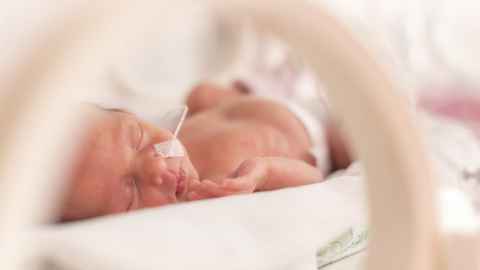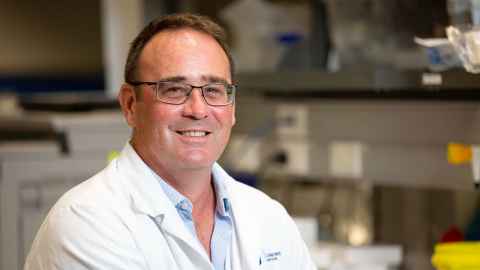Newborn genomic sequencing offers hope for hundreds of sick babies
30 November 2023
Two black boxes the size of a small loaf hold the key for rapid diagnosis of more than 100 babies born each year with rare diseases.

Newly arrived genome sequencing machines installed at the Liggins Institute will be able to map a newborn’s DNA within a few days – or even hours – of the baby being moved to the newborn intensive care unit (NICU) at Auckland’s Starship Hospital.
Once the data crunching is done, researchers will compare the babies’ data with that of their parents in a race-for-time game of ‘spot the difference’.
Variations between a baby’s DNA and that of their mum and dad could signal the baby has one of several hundred rare conditions. In a best-case scenario, doctors will be able to quickly gauge the best treatment for the baby.
But even when nothing can be done, knowing why their baby died can be helpful for whanau, both in terms of dealing with the tragedy, and potentially planning for future pregnancies.
“Rapid diagnosis provides certainty for the family in highly stressful situations in which they often are expected to contribute to major decisions about provision of care,” says Professor Frank Bloomfield, University of Auckland deputy vice chancellor of research and former Liggins Institute director.
Until now, the vast majority of sick babies in New Zealand had no access to genetic sequencing; in exceptional circumstances blood samples were sent to Australia, but the process was rare, took several weeks, and cost around $16,000.

Now the work can be done on any baby that needs it, in less than seven days, says Professor Justin O’Sullivan, who leads both the Liggins Institute and the genomics sequencing team.
The two sequencing machines are unexpectedly small - the size of a desktop speaker - but the technology is cutting edge.
“There are three billion bases of DNA, and we look at all of it,” O’Sullivan says. “We compare it to the parents and we try and see the differences that are unique to the child.”
An abnormality could be caused by a wide range of conditions, including epilepsy and metabolic problems - where the baby isn’t able to break down certain foods, or isn’t getting enough of a certain nutrient.
“Some of these conditions can be treated, and if you get to them quickly it can make a massive difference and prevent long-term damage for the baby.”
While other genetic conditions cannot be diagnosed or have no treatment options, that’s changing all the time with advances in genetics and medical understanding, O’Sullivan says.
“A rare condition is something that occurs in one in 2000 people and there are about 7000 rare disorders we are aware of. But rare disorders are much more frequent in neonatal intensive care – up to 30 percent of the babies that are there. Given that on any one day in New Zealand there are around 200 children in neonatal intensive care, that’s a huge number of these conditions.
“At the moment we can treat a few hundred, but over time we will be able to treat more and more of those 7000.”
For the first few months of the programme, testing will be limited to newborn babies in intensive care, where doctors suspect some sort of genetic disorder. But once the system is bedded in, possibly as early as mid-2024, testing can be expanded to sequence older children and adults with a genetic condition; people who might never have been able to get a diagnosis in the past.
“There are approximately 150,000 children with rare diseases in New Zealand,” says Denis Nyaga, one of the newborn genome project researchers tasked with decoding the genetic data from the sequencing machines to try to come up with answers for doctors and whanau.
“Less than half of these children are diagnosed by the time they turn one, and almost a quarter end up waiting more than ten years for a diagnosis,” he says.
“Around 70 percent of these cases might be to do with a genetic mutation, which might be identified with a genetic test.”
The Liggins Institute genomics sequencing work has been funded by philanthropists including the Dines Family, Tautoko, and Kelliher charitable trusts.
Listen to Justin O'Sullivan talking to Kathryn Ryan on RNZ's Nine to Noon show.
Media contact
Media adviser Nikki Mandow
M: 021 174 3142
E: nikki.mandow@auckland.ac.nz